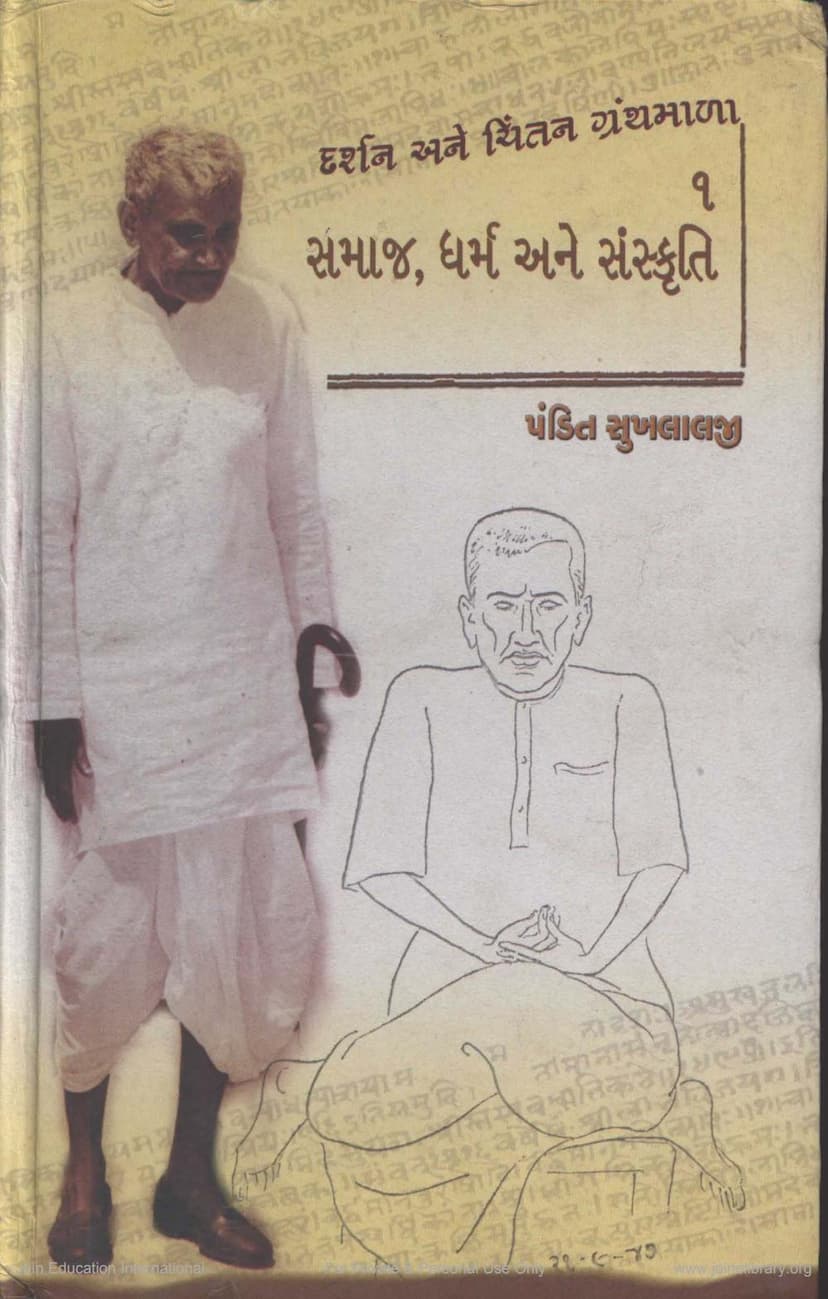Samaj Dharma Ane Sanskruti
Added to library: September 2, 2025

Summary
Here's a comprehensive summary of the Jain text "Samaj, Dharm ane Sanskruti" by Pandit Sukhlal Sanghavi:
Book Title: Samaj, Dharm Ane Sanskruti (Society, Religion, and Culture) Author: Pandit Sukhlal Sanghavi Publisher: Gurjar Granthratna Karyalay
This book is a collection of essays by the renowned Jain scholar Pandit Sukhlal Sanghavi, exploring the interconnectedness and nuances of society, religion, and culture. The essays, originally published in the series "Darshan ane Chintan," offer profound insights into these fundamental aspects of human existence from a Jain philosophical perspective, while also engaging with broader societal and spiritual questions.
Key Themes and Arguments:
The book delves into various aspects of social, religious, and cultural life, offering critical yet constructive analysis. Pandit Sukhlalji, known for his profound scholarship, clear thinking, and ability to present complex ideas in an accessible manner, addresses the following key themes:
-
The Intertwined Nature of Society, Religion, and Culture: The essays emphasize that society, religion, and culture are not isolated entities but are deeply interwoven. A healthy society requires the sustenance of culture and the ethical guidance of religion. He notes how societal changes, the accumulation of detrimental practices (kusanskar), rigidity, and ignorance can hinder individual and collective development, ultimately impacting culture and religion.
-
The Essence of True Religion: Pandit Sukhlalji differentiates between the external rituals and forms of religion (the "body") and its inner spiritual essence (the "soul"). He argues that true religion lies in virtues like truth, love, selflessness, generosity, discretion, and humility. He laments how religion, when entangled in mere external practices and sects (panth), can lose its soul and become distorted. He criticizes religious institutions, leaders, and educational systems when they become rigid and inactive, leading society away from true religious principles. He defines religion as a fervent pursuit of truth coupled with judicious equanimity, guiding life's interactions.
-
Critique of Ritualism and Superficiality: A recurring theme is the criticism of religious practices that become mere external rituals devoid of inner meaning. He highlights how the focus on outward appearances, costly ceremonies, and ostentatious displays by religious figures can exploit followers and lead to a spiritual void. True religiosity, he asserts, is found in the inner transformation and virtuous conduct.
-
The Importance of Intellectual and Ethical Development: The author stresses the need for open-mindedness, critical thinking, and a continuous quest for truth. He criticizes the modern educational system's overemphasis on mere information acquisition without fostering moral and spiritual growth. He advocates for a disciplined and persistent pursuit of knowledge (tapasya) that cultivates strong character.
-
The Role of Students and Educators: He addresses students, urging them to learn the "art of living" – to be content with minimal resources, to rely on self-effort, and to create their own reality. He also emphasizes the responsibility of educators to impart knowledge with dedication, dispel doubts, and foster critical thinking and ethical values.
-
The Philosophy of Life and Conduct: Through essays like "Jivanshilp nu Mukhya Sadhan" (The Main Instrument of Life Shaping) and "Jivanpath" (The Path of Life), he explores how to build a meaningful life through introspection, self-discipline, and ethical living. He emphasizes that true development is not just physical or intellectual but also spiritual, requiring a balanced approach to all aspects of life.
-
Social Commentary and Reform: Pandit Sukhlalji addresses contemporary social issues with clarity and logic. He examines the decline of religious practices due to the rigidity and inactivity of religious leaders and institutions. He highlights the erosion of values in contemporary society and the need for students to cultivate intellectual curiosity and remain open to truth, free from prejudice. He also touches upon comparative religion and the need for a neutral and empathetic study of different religious traditions.
-
Praise for Pandit Sukhlalji's Scholarship and Character: The preface and introductory sections of the book highlight Pandit Sukhlalji's immense contribution to Indian philosophy and Jainology. His deep learning, clarity of thought, transparent presentation, profound humility, and unwavering commitment to truth are lauded. His life is described as a testament to the integration of knowledge, conduct, and spiritual practice. The book is presented as a tribute to his legacy and a means to keep his valuable thoughts alive.
Structure and Content:
The book is divided into several sections, each containing essays on related themes. The content covers a wide range of topics including:
- Society and Religion: Essays discussing the state of society, the challenges faced by religion, the distinction between spiritual and ritualistic aspects of faith, and the need for religious reform.
- Jainism and Philosophy: Deep dives into Jain principles, its philosophical underpinnings, comparative studies with other Indian philosophical systems, and the intellectual legacy of Jain thinkers.
- Personal Reflections and Life Philosophy: Essays offering guidance on life skills, personal conduct, ethical frameworks, and the pursuit of knowledge and self-realization.
- Social and National Issues: Discussions on social reform, national development, the meaning of freedom, the principles of democracy, and the role of individuals in building a just society.
Overall Significance:
"Samaj, Dharm Ane Sanskruti" is a seminal work that offers a timeless perspective on the human condition. Pandit Sukhlal Sanghavi's writings are characterized by their intellectual rigor, ethical depth, and compassionate understanding of human nature. The book serves as a guide for individuals seeking to navigate the complexities of life, understand the true meaning of religion, and contribute to the betterment of society and culture. It encourages a balanced approach that integrates intellectual pursuit with ethical living and spiritual awareness.